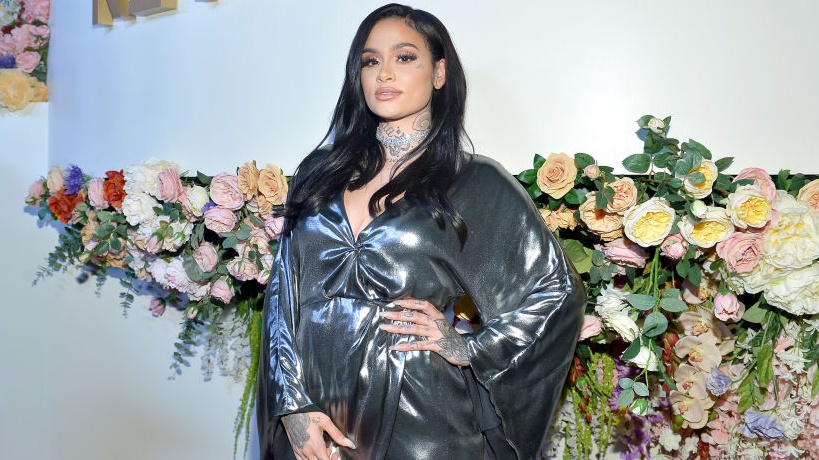As conversations around gender expression and sexuality continue to permeate the world stage, Kehlani is taking advantage of her platform by promoting authenticity and uplifting the LGBTQ+ community.
In her latest feature by The Advocate, Kehlani recognized “all the beautiful Black trans women that I have in my life that I’m able to just witness — not only living their true f**king power — but [to] be courageous and be fearless and then fiercely educate everybody around them and just be a force in this world!”
“They do it so effortlessly that it comes off almost easy to people who don’t know them,” she added. “I have so many super badass, bad b***h, trans women friends that I’m just like, ‘I bet people think this s**t is a walk in the f***king park because of how you get up and get out the house every day and be this badass b***h.’ But I know it’s f***king hard.”
The R&B singer, who previously identified as queer, said in an Instagram Live on Tuesday, that she is a lesbian. The 25-year-old also uses she/they pronouns and is no stranger to advocating for queer visibility.
In 2018, she tweeted, “sexuality has never seemed black & white, it’s a spectrum, often times finding what u feel you most identify with takes patience and in the case of our society, a lot of confidence. happy bi-visibility day, i hope you feel seen today and everyday.”
sexuality has never seemed black & white, it’s a spectrum, often times finding what u feel you most identify with takes patience and in the case of our society, a lot of confidence. happy bi-visibility day, i hope you feel seen today and everyday.
— Kehlani (@Kehlani) September 23, 2018
After receiving praise for her ongoing advocacy, Kehlani also credited Black trans women for being the true movers and shakers while traversing a heteronormative world.
“Thank you for all the love, as far as the bravery comments i want to s/o the people that TRULY are the MOST brave and that’s black trans / queer people out there in the field everyday risking their lives for equality & representation," she wrote on Twitter. "thank you for existing & embodying true love.”
thank you for all the love, as far as the bravery comments i want to s/o the people that TRULY are the MOST brave and that’s black trans / queer people out there in the field everyday risking their lives for equality & representation. thank you for existing & embodying true love.
— Kehlani (@Kehlani) June 6, 2018
Kehlani also championed for Black trans women to get the flowers she deserves and encouraged those who have been recognized to divert their praise towards the ones who haven’t.
“We need more black trans women honored by huge corps and platforms as being 'queer icons,'" she wrote in a tweet. “We need more queer POC standing up against homophobic governments in other countries honored. so if they won’t be directly honored, those who are, should take a moment to nod that way.”
we need more black trans women honored by huge corps and platforms as being “queer icons”. we need more queer POC standing up against homophobic governments in other countries honored. so if they won’t be directly honored, those who are, should take a moment to nod that way.
— Kehlani (@Kehlani) October 7, 2018
In the summer of 2020, Kehlani released a single entitled “Can I” which highlights sex workers, a demographic that is mostly comprised of Black trans women.
“Overwhelmingly, those folks are Black trans women, Black cisgender women, and other Black queer and trans people—including youth," the video’s PSA reads. “Black people—as well as Indigenous people and other people of color—deserve to be able to perform sex work without any limitations or stigmas attached, and this means that everyone must commit to learning from sex workers about sex work and sex workers’ needs.”
As the new generation of musicians continues to incorporate social commentary into their work, Kehlani expressed her gratitude for having moments of reckoning.
“Beyond even being celebrated, we get so much education from one another,” she said to The Advocate, about the new generation’s open-minded demeanor.
“There are so many people willing to have conversations where people who don’t understand can potentially understand. So many people are willing to have teachable moments. That’s awesome because a lot of…hurt and anger in the past generations have been rooted in truly not understanding or not having access to educational moments," she added.
As for the future she envisions for their 2-year-old daughter, Adeya, Kehlani says she is going to incorporate the queer identity into their child’s upbringing.
“I just want my daughter to know that it’s OK to feel you don’t agree with any of that and it’s OK to march to the beat of your own drum,” she explained. “All my friends, all her aunties, uncles, her godparents, everybody is just loudly queer. Our generation already kind of broke the mold of getting to that point, so I don’t even think our kids are going to think about it as something that they have to identify and differentiate. I feel it should be normal.”
“We’ll be reading queer stories, queer books where the baby has two dads, two moms, two parents who don’t identify as either,” she added. “Movies that have that. She sees healthy queer couples. So, I don’t think that she’s going to even think about it as, 'This is different from normal.'”
When reflecting on the ebb-and-flow of her career, the trailblazer expressed, “I’ve already made it so much farther than I ever dreamed. So everything that happens is a blessing.”
